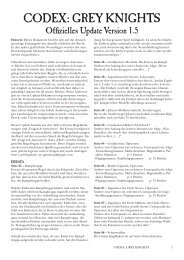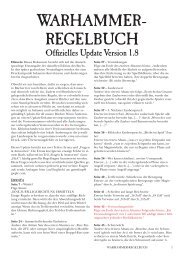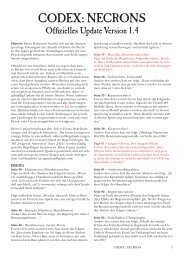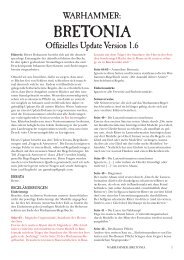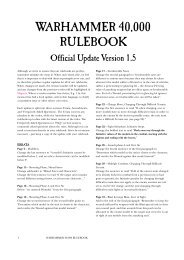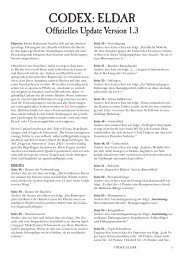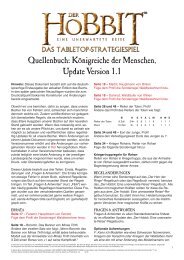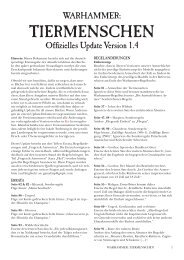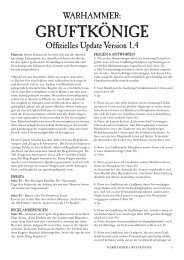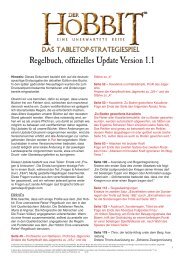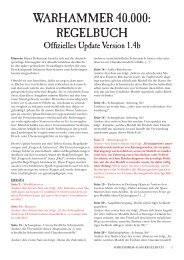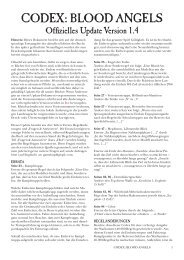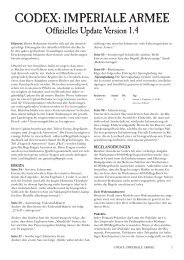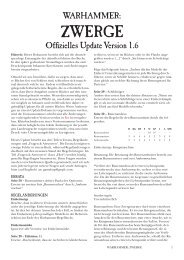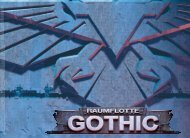Necromunda rulebook - Games Workshop
Necromunda rulebook - Games Workshop
Necromunda rulebook - Games Workshop
Create successful ePaper yourself
Turn your PDF publications into a flip-book with our unique Google optimized e-Paper software.
NECROMUNDA<br />
TRADING POSTS<br />
Every medium-sized settlement has at least one trading post where Guilders and local traders sell<br />
their goods and buy items they want. The Guilders also act as bankers, exchanging items for credit<br />
which can be spent in any trading post in the Underhive.<br />
The trading post in a large settlement might enclose<br />
a substantial area with many traders offering goods<br />
and services. Small settlements are served by<br />
travelling Guilders, poor cousins to the rich<br />
merchants of the Hive City, itinerant tradesmen who<br />
hike their wares from one place to another.<br />
SPENDING Credits<br />
After every game a gang can collect income from its<br />
territories as described earlier. Credits can be spent<br />
on recruiting new fighters and on new equipment for<br />
the gang.<br />
New Recruits<br />
New fighters are recruited in the same way as the<br />
original gang. Refer to the Recruiting a Gang section.<br />
New recruits may be armed with any of the weapons<br />
described in the Gang Recruitment list, but cannot be<br />
given other equipment until they have fought at least<br />
one battle.<br />
Gangs can recruit whatever type of fighter the player<br />
wishes, but the usual restrictions apply regarding the<br />
number of leaders, heavies and so on. For example, a<br />
player cannot recruit a second leader or have more<br />
than two heavies in a gang.<br />
Recruiting Hired Guns<br />
Players may hire mercenary fighters for the gang if<br />
they wish. Refer to the Hired Guns section for details.<br />
Hired Guns are wanderers who are willing to sell<br />
their expert skills to anyone prepared to pay.<br />
Weapons<br />
If players want to buy new weapons or other<br />
equipment for existing gang fighters then refer to the<br />
trading charts below. The charts list all the equipment<br />
available in the Underhive, not just the common<br />
weapons included in the Recruitment charts. Rarer<br />
items and weapons are not always available and vary<br />
in price. Remember that each house must adhere to<br />
its own house weapons list as well.<br />
When to Buy<br />
Players should preferably complete their recruiting<br />
and trading after the battle is over, making any<br />
appropriate dice rolls while both players are present.<br />
Alternatively, players may prefer to wait until the heat<br />
of battle has cooled and they are able to consider<br />
purchases more carefully. Determine which rare<br />
items are offered for sale whilst both players are<br />
together. The players can then work out what they<br />
will buy later.<br />
96<br />
TRADING<br />
Common items can be bought quite readily in any<br />
Underhive settlement, either from a trading post or<br />
directly from a workshop. Players can purchase as<br />
many of these items as they want. The price for<br />
common items is fixed, so players always pay the<br />
same for them.<br />
Rare items are hard or even impossible to find. Only<br />
occasionally do such items turn up for sale and the<br />
price asked is often way and above their true value.<br />
Players must be prepared to snap up useful items as<br />
they are offered, especially the really hard-to-get<br />
weapons and equipment.<br />
To represent the scarcity of rare items each player<br />
makes a dice roll at the start of his trading session to<br />
determine what goods are offered to him. To<br />
determine how many rare items are offered roll a D3<br />
(ie, a D6 counting 1-2 as 1, 3-4 as 2 and 5-6 as 3). This<br />
is the number of items offered to the gang leader as<br />
he scours the trade posts and visits his contacts in the<br />
drinking holes and gambling dens.<br />
Roll D66 for each item and consult the Rare Trade<br />
chart to discover what is on offer. The player may buy<br />
any of the items offered, but only one of each item<br />
unless the same result is rolled more than once.<br />
Note that each player rolls separately for his trading –<br />
the gangs don’t necessarily hide out in the same<br />
place nor do they have the same contacts. One player<br />
cannot buy goods offered to another.<br />
Gangers and Trading<br />
If a player wishes he can use a ganger to search<br />
around the trade post and make enquiries about<br />
further rare items which might be for sale. A ganger<br />
who does this cannot collect income from the gang’s<br />
territory that turn; searching out rare items is an<br />
alternative to collecting income.<br />
For each ganger employed in this fashion you may<br />
add a further +1 randomly generated rare items to<br />
the list of those offered for sale. Extra gangers will<br />
not grant additional weapons purchased that are not<br />
on your house weapon list.<br />
Rare Trade Chart<br />
The following chart is used to determine what rare<br />
trade items are offered for sale to the gang leader. D3<br />
items are offered automatically and a further +1 for<br />
each ganger sent to search them out. The prices of<br />
rare items are given on the main trade charts.



